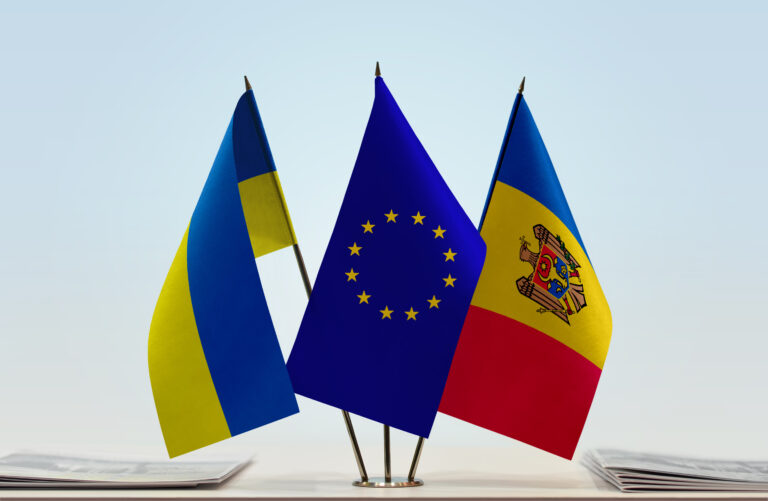
Commentary – European Commission’s Enlargement Package for Ukraine and Moldova
Thursday, the European Commission, under the leadership of President Ursula von der Leyen, embarked on significant strides towards the enlargement of the European Union, elucidating the present stance of candidate countries[1]. Notably, Ukraine and Moldova play pivotal roles in the ongoing operations of the European Enterprise Alliance within these nations. The endorsement of the 2023 Enlargement Package marked a crucial juncture in the EU’s dedication to the accession processes of diverse countries. President von der Leyen underscored the imperative nature of completing the Union, citing historical significance and substantial economic and geopolitical benefits for both accession countries and the EU at large. The merit-based accession process remains paramount, with the progress of each country serving as a determining factor.
In a groundbreaking move, the Commission advocated for the initiation of accession negotiations with Ukraine and Moldova, acknowledging their considerable advancements in fulfilling the outlined steps for EU membership. Despite the ongoing challenges, Ukraine has showcased a steadfast commitment to reform, implementing transparent pre-selection systems, judicial reforms, anti-corruption measures, and aligning with the EU acquis. Similarly, Moldova has made notable strides in justice reform, anti-corruption endeavours, and various other crucial areas. The Commission’s approval for negotiations aligns with the positive trajectory of their reforms. Detailed progress reports spotlight the transformative efforts made by these countries across various spheres, showcasing their dedication to European values and standards. President von der Leyen reiterated the EU’s support for these accession processes, emphasizing the shared benefits of previous enlargements. The Commission stands prepared to report on the progress of key measures adopted by Ukraine and Moldova by March 2024. This strategic move follows the applications for EU membership submitted by Ukraine, Moldova, and Georgia in February 2022. The conferment of candidate status to Ukraine and Moldova in June of the same year laid the foundation for the current recommendations.
“Ukraine has completed – I was there over the weekend and was convinced of it – well over 90% of the necessary steps that we set out last year in our report.’’ – Ursula Von der Leyen, President of the European Commission[2].
The prospective membership of Ukraine and Moldova in the European Union presents substantial advantages and benefits for both the candidate countries and the EU as a whole.
To start with, accession would act as a catalyst for economic development and growth in both nations. By aligning with the EU’s common market, Ukrainian and Moldovan businesses would gain enhanced access to a vast and prosperous consumer base. Adhering to EU standards would not only improve the quality of goods and services but also foster innovation and competitiveness within these economies. Following, EU membership provides significant political stability and security. For Ukraine, a country dealing with the aftermath of Russia`s war on Ukraine, integration into the EU represents a crucial step towards consolidating democratic institutions and the rule of law. Moldova, too, would benefit from the shared security framework of the EU, contributing to regional stability. Access to EU funds and support mechanisms would empower both countries to address ongoing challenges, including corruption, and strengthen their governance structures. Moreover, cultural, and societal ties between the EU, Ukraine, and Moldova would be reinforced, fostering a sense of unity and cooperation. Additionally, Both Ukraine and Moldova have shown a shared commitment to tackling global challenges, particularly in reaching climate targets, in tandem with their pursuit of EU membership and they have stated that they are committed to helping with the energy transition, in line with the climate goal of the European Union. Through the integration of renewable energy initiatives, environmentally sensitive legislation, and sustainable behaviours, Ukraine and Moldova hope to play key roles in furthering global efforts towards a greener future. The exchange of ideas, people, and cultural influences would enrich the social fabric of the EU, promoting diversity and understanding. In essence, the accession of Ukraine and Moldova into the EU holds the promise of a more integrated, stable, and prosperous European continent, reflecting the core values of democracy, cooperation, and shared prosperity.
As the EU continues its expansion, these developments underscore the union’s commitment to fostering stability, democracy, and prosperity in its neighbouring regions. The upcoming months will undoubtedly witness further discussions and progress updates, shaping the future landscape of a more integrated and united Europe.
***
[1] “Commission Adopts 2023 Enlargement Package, Recommends to Open Negotiations with Ukraine and Moldova, to Grant Candidate Status to Georgia and to Open Accession Negotiations with BiH, Once the Necessary Degree of Compliance Is Achieved.” European Commission , 8 Nov. 2023, ec.europa.eu/commission/presscorner/detail/en/ip_23_5633.
[2] “Press Corner.” European Commission, 8 Nov. 2023, ec.europa.eu/commission/presscorner/detail/en/statement_23_5641.
See more: 24.12.2023 Commentary: European Commission’s Enlargement Package for Ukraine and Moldova
Made at the tip of Africa. ©
